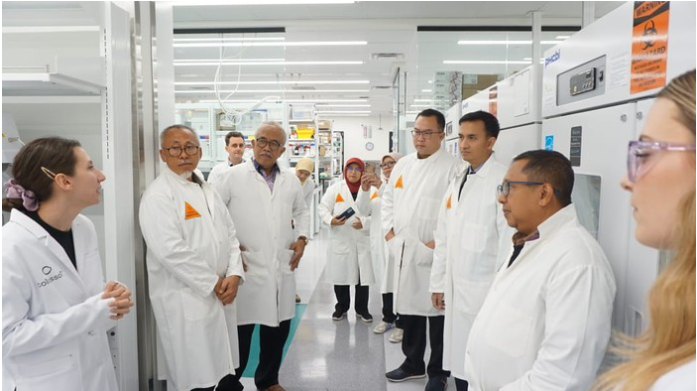IPB University Collaborates with Colossal Bioscience and Re:Wild in Dallas, Texas for the Conservation of Endangered Species

IPB University collaborates with Colossal Labs and Re:Wild in Dallas, Texas in the field of conservation of endangered species. Both are non-governmental organizations in the field of conservation. The signing of an international collaboration between IPB University, Colossal Biosciences, and Re:Wild was carried out at the Workshop on the World's Leading Researchers in Sumatran Rhino Reproduction in Dallas some time ago.
There were seven IPB University delegates who attended this activity. Led by the Rector of IPB University, Prof Arif Satria, three of the other IPB University representatives came from the School of Veterinary Medicine and Biomedical Science (SKHB). They are Prof Bambang Purwantara, Prof Arief Boediono, and Dr. Drh Muhammad Agil, MScAgr, DiplACCM.
The collaboration includes research activities on the breeding and conservation of the Sumatran Rhinoceros. The cooperation agreement was signed by the Rector of IPB University, Prof Arif Satria, the Founder and CEO of Colossal Bioscience, Ben Lamm, and the Chief Scientist and CEO of Re:Wild, Wes Sechrest, PhD. The signing of this agreement was witnessed by the Deputy Consulate General of the Republic of Indonesia (KJRI) in Houston, Oktorian Hakim.
Rector of IPB University, Prof Arif Satria, said that Colossal Bioscience is currently running a project to revive mammoths—animals resembling giant elephants—that became extinct in the ice age through a gene-editing process.
"Colossal Bioscience supports the conservation efforts of the Sumatran Rhinoceros as a priority for endangered animals in the world. Meanwhile, Re:Wild is an institution that aims to protect and restore endangered wildlife," he explained. In addition to cooperation with Colossal Labs and Re:Wild, IPB University also established a collaboration with Station College Texas A & M University in Dallas, Texas, USA.
"The success of increasing the Sumatran Rhino population is not only beneficial for the conservation of endangered animals in Indonesia but also for other endangered animals in the world," said Prof Arif Satria.
With this collaboration, Prof Arif hopes that the capacity of IPB University will increase and be increasingly recognized by the world as a World Class University. Reporting from the World Wide Fund for Nature, there are five rhino species in the world, namely: the white rhinoceros in Africa, the black rhinoceros in Africa, the one-horned rhinoceros in Asia, the Javan Rhinoceros, and the Sumatran Rhinoceros in Indonesia. The Sumatran Rhinoceros (Dicerorhinus sumatrensis) is the only Asian rhino to have two horns. In Indonesia, Sumatran rhino breeding is carried out in Way Kambas National Park (TNWK).
The latest development in the Sumatran Rhinoceros is that a female rhino named Rosa gave birth to a female rhino cub on March 24, 2022. Rhino cubs are born from the mating of Rosa with the male rhino Andatu. The birth of the female rhinoceros from the Rosa rhinoceros is the result of the ninth Rosa rhino's gardening, with a pregnancy period of 476 days. (AP/Zul) (IAAS/MZS)



